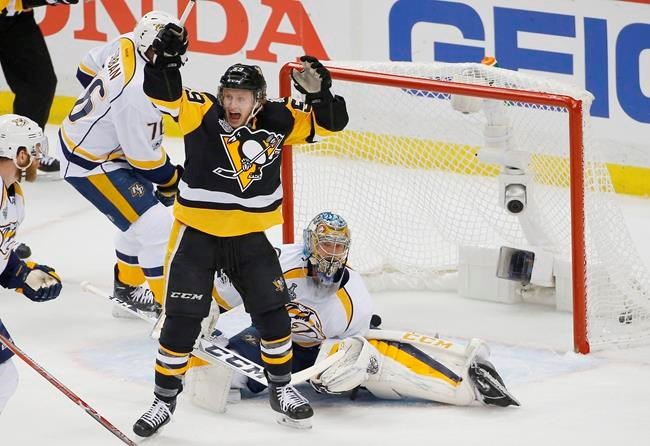PITTSBURGH — Penguins winger Jake Guentzel was such an unknown commodity that his own captain hardly knew who he was before the season began.
"I heard some of the scouts and some of the people who were involved in the (prospect) camps talking about him, but didn't know a lot about him as a player," Sidney Crosby said of the 22-year-old.
Now the one-time stick-boy for Phil Kessel and little-known prospect from an unlikely hockey outpost has become an out-of-nowhere star for the Penguins. His fourth game-winning goal of the playoffs, coming Monday against Nashville in Game 1 of the Stanley Cup final, equalled an NHL rookie record and pushed the Penguins closer to a second straight crown.
A former third-round pick, Guentzel joined the Penguins in November from the American Hockey League and scored twice in his first NHL game. He finished the year behind only Auston Matthews and Patrik Laine in goals and points per-game among rookies.
Guentzel played mostly with Crosby, potting 16 goals on 81 shots while adding 17 assists in only 40 regular-season games. He's continued firing away in the playoffs, leading all players with 10 goals this spring — eight of them at even-strength. He's only the fifth rookie ever to reach double-digits in goals in a single playoff and four points shy of the NHL rookie record for points — a mark held by Dino Ciccarelli and Ville Leino, who each had 21.
Guentzel was born in Omaha, Neb., and raised in Minnesota, and it was there that he first came into contact with Kessel as a stick-boy for the University of Minnesota Golden Gophers where his father, Mike, worked as an assistant coach.
Kessel ended up as his first NHL linemate — Evgeni Malkin was the other — and set up his first goal, but long before that Guentzel was a real question mark to even crack the league. He was ranked 80th among North American skaters by NHL central scouting ahead of the 2013 draft and went 77th overall to the Penguins.
The biggest knock against him was his size — he was only five foot nine and less than 160 pounds ahead of the draft.
It didn't matter in college hockey, where he ripped up the NCAA from the spot of his birthplace — the University of Nebraska-Omaha — and again in the AHL, which he proceeded to tear it up (28 goals, 62 points in 54 games) during brief stints last year and again this fall.
Those who saw him there in Wilkes-Barre weren't surprised when he stepped into the NHL and did similar things.
"Honestly, you could ask anybody down there they weren't shocked at all," Penguins defenceman Chad Ruhwedel said of Guentzel, who looks smaller than his listed 180 pounds. "He was lighting it up down there and you could just see the plays he would make. They weren't just like highlight reel-goals, but he's scoring in the dirty areas and stuff. And then he comes up here and does it (again).
"Honestly, guys aren't surprised at all."
Crosby noticed the hockey sense first. The speed and skill was obvious, "But I think just the hockey sense was something you could see right away," Crosby said. "You could see some plays, especially as he got more and more comfortable to make those plays, you could see it came pretty easy to him."
Guentzel cooled off after a wicked start to the playoffs and was questionable to even play in Game 1 against the Preds after a forgettable end to the Eastern Conference final. He played a team-low 14 minutes in the double overtime Game 7 win against Ottawa and was dropped from Crosby's line.
He hadn't scored in eight straight before Monday's big goal and Penguins head coach Mike Sullivan wondered if he was tiring from so much hockey — the most of his young career. Sullivan listed him as a game-time decision for Game 1 against Nashville, and though he gave Guentzel the nod over Carl Hagelin, he started him on a fourth line with Matt Cullen and Patric Hornqvist.
Sullivan said they never lost faith and Guentzel rewarded it by breaking a 3-3 tie with just over three minutes left in regulation. It was his first shot of the game and first by the Penguins in 37 minutes.
"He just stayed with it," Crosby said. "I think he just kept going to the same areas, kept competing and if you do that eventually those chances will go in and he got a big one for us (Monday) night."
Jonas Siegel, The Canadian Press

